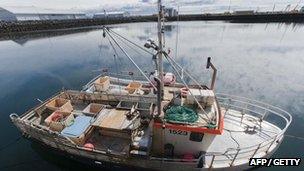Davos 2013: Iceland slams Europe over fishing policy
- Published

Iceland's president has dismissed the European Union's Common Fisheries Policy as a "colossal failure" as some 75% of Europe's fish stock is endangered.
The policy sets quotas for each of the 27 member states and for types of fish.
"Europe is the problem," Olafur Ragnar Grimsson said at the World Economic Forum in Davos, Switzerland.
"It is paradoxical that Europeans see themselves as the most enlightened policy makers in the world," he added.
The global figure for stocks of fish that are endangered or in a very bad shape is 20%, according to Frans Muller, chief executive of German supermarket group Metro, which he says is "by far the largest seller of fish in Europe".
The director of the University of California's Scripps Institution of Oceanography agreed that the situation is very serious, and not only in Europe.
"We've engaged in a war on fish and we've won," he said. "We can't afford to prevail in this war. We have to back off."
Feed the world
Fish is a vital source of protein and is about to become ever more important as the world's population increases to 9 billion by 2050, said the World Bank's vice president of sustainable development, Rachel Kyte.
"It is an essential part of food security," she said.
Oceans are hugely valuable resources, she added, valuing ocean tourism alone at $161bn for the world economy. Fishing, tourism and aqua culture provides 300 million jobs, she said.
Metro's Mr Muller was critical of the way the current fisheries policy forces fishermen to throw an estimated 20% of their catch overboard because it does not fit with their quotas.
"The economic cost of that mismanagement is $50bn per year," said Ms Kyte. "That's $50bn that we just throw back into the sea as waste."
Dead seas
Unless something is done to reverse the decline in Europe's fish stock, the oceans here will be as devoid of life as deserts are in just four decades from now, President Grimsson said.
"The only things that will float around are giant jelly fish," he said. "It is time we took a look in the mirror. Is this the top of the European agenda? No.
"Is this on the radar of European leaders who meet several times a year to talk about the banking crisis? No."
Prince Albert II of Monaco agreed. "We need to act quickly to save our natural environment," he said.
"We need to consider oceans not as static but as living areas. We have to know our oceans, to help our oceans, to protect our oceans so they can have a future and we can have a future."
Mobile solution
Only two countries in Europe have been managing their fisheries in a sustainable fashion - Iceland and Norway, Mr Grimsson claimed, pointing out that neither is a member of the European Union.
But whereas he was concerned about the future of the oceans that are so important to his country, he also said there were reasons to be optimistic about the future.
Fish caught in a sustainable manner can be labelled electronically, so modern technology, such as mobile telephones or smartphones, have now made it possible for consumers to check exactly where the fish they buy comes from, he says.
Technology that accurately maps the movement of all boats also exists, and it costs less than $100 per boat, Mr Grimsson said, insisting it should be compulsory for boats to be kitted out with such kit before leaving port, the way an aircraft is not allowed to take off without the correct instruments on board.
You can follow Jorn's coverage from Davos on Twitter @jornmadslien.